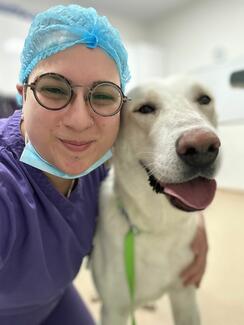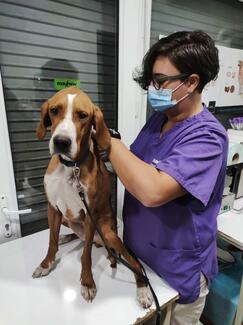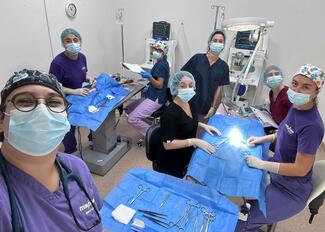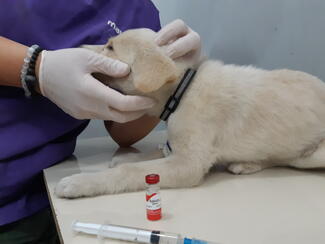
Your Work
Where do you work?
Mayhew Georgia Veterinary Clinic, Tbilisi, Georgia
When did you start your work?
2017
What rabies elimination work do you do?
Mayhew Georgia delivers animal population management and disease control programmes in Tbilisi, the capital and in the regions of Georgia outside the capital where small animal veterinary provision is extremely limited or non-existent. The focus is primarily on dogs presently, although cats are helped too. We provide free neutering, rabies vaccinations, complex vaccinations, parasite control and ear tags free of charge for the roaming and community dogs in the capital as well as shelter dogs awaiting adoption and helping vulnerable owners with vulnerable pets on a case by case basis. In Tbilisi we collaborate with the local authority who bring dogs to the clinic as part of our TVNR programme. In the regions we deliver mobile/pop-up clinics with permission of the local municipalities, carrying out a count of the roaming dogs in the targeted area first, then catching them, neutering, rabies vaccination, complex vaccination, parasite control and ear tag before release. We provide information leaflets for municipalities and residents on the importance of rabies vaccinations as well as other preventative veterinary care. In the regions, owned dogs can use our services as well as frequently it is the only time they will see a vet for basic care.
We also work closely with the Vet Faculty of the Free Agrarian University in Tbilisi, providing training places for vet and vet tech students as well as information on animal population management and disease control. We provide training for already qualified vets and vet techs as well and insist they are vaccinated against rabies to have a place. We advise the local Municipal Shelter including on protocols for animals that come to them with suspected rabies or that have bitten.
Your Work in Numbers
Number of animals vaccinated against rabies (last year) 1721
Number of animals sterilized (last year) 1769
Number of children educated (last year) 0
Number of adults educated (last year) 45
Number of Professionals trained (last year) 22
Number (Other) last year: Given vaccines against common canine infectious diseases: 1625
Your Work's Impact
Although in Georgia there are still cases of rabies, there is not widespread acceptance of the importance of vaccinating animals or people who work with animals. It is mandatory to vaccinate dogs against rabies in Georgia but there is a lack of compliance. Even within the veterinary and animal care profession there is suspicion of pre-exposure rabies vaccinations due to old wives tales of what people can or can't do following the injections.
Mayhew Georgia has consistently promoted the importance of rabies vaccinations for dogs, cats and people working within dogs/in the veterinary or animal care professions.
We have helped provide evidenced based data on the dog populations in Tbilisi, the capital, with the first comprehensive dog survey in 2023 which is assisting the local authorities to develop a strategy to manage the roaming dog population. We have likewise carried out similar surveys on a smaller scale in the regional municipalities where we work providing data for the municipality and local communities and disseminating the importance of vaccination during our mobile-pop-up clinics and workshop presentations for focus groups.
Partners
Government partners
Animals Monitoring Agency, Tbilisi City Council
Dusheti Municipality, Mtshketa-Tianeti region, Georgia
Tetritskaro Municipality, Kvemo-Karlti region, Georgia
Government collaboration:
Animals Monitoring Agency - 10 years, Dusheti & Tetritskaro Municipality 1 year
NGO Partners
Free Agrarian University Vet Faculty, Tbilisi
National Democratic Institute, Georgia branch
FAO Georgia
NGO collaboration:
Free Agrarian University Vet Faculty - 9 years, NDI 2 years, FAO 1 year
Other partners
Doggie Doc Ltd
Other collaboration:
3 years
Innovations and Learnings
What is innovative about your approach?
Mayhew Georgia is the only international NGO working on small animal welfare in Georgia. Our approach is non-partisan. We collaborate with the national and local authorities as we believe this is essential to bring in long-term change and sustainability.
We provide evidence-based solutions to issues around animal population management and disease control.
We recognise that the involvement of the veterinary profession is a significant element within delivery of any disease control and dog population management programme and as such one of our main focus areas is training and capacity building within the Georgian veterinary profession to international standards.
Lessons learned (Positive)
Collaborating with a broad spectrum of partners gets more done.
With patience you can change minds and methods.
Lessons learned (Negative)
We have trained many of the vets who have worked at the Municipal Shelter in Tbilisi and they have become competent in small animal reproductive surgery as a result, but once we have left, there has been little motivation to put into practice what has been learnt and more importantly why. The turnover of veterinary staff and dog catching staff at the Municipal Shelter is an issue. So we train those who actively come to us and want to learn more and the results are more satisfying and longlasting.
** All information adapted from the submitted nomination form**



